Intel Core Ultra 9 285K Rated: 7.5/10 AMD Ryzen 9 7950X3D Rated: 9/10
Pros And Cons
| CPU | Pros | Cons |
|---|---|---|
| Core Ultra 9 285K | ✅ Has 8 more physical cores ✅ More modern manufacturing process | ❌ Much more expensive |
| Ryzen 9 7950X3D | ✅ Has 92 MB larger L3 cache size ✅ Better in terms of performance | ❌ Minor improvements |
Comparison Table
| Feature | Core Ultra 9 285K | Ryzen 9 7950X3D |
|---|---|---|
| Codename | Arrow Lake | Zen 4 (Raphael) |
| Model number | 285K | - |
| Integrated GPU | Arc Xe2 (Arrow Lake-S) | Radeon Graphics (Ryzen 7000) |
| Transistors | - | 13.1 billions |
| Fabrication Process | 3 nm | 5 nm |
| Socket | FCLGA-1851 | AM5 |
| Best Motherboards | - | Best Motherboard For Ryzen 9 7950X3D |
| Best CPU Coolers | - | Best CPU Cooler For Ryzen 9 7950X3D |
| Processor Review | Core Ultra 9 285K Review | - |
Architectural Differences
- Core Count: The Core Ultra 285K has 24 cores and 24 threads (8 P-cores and 16 E-cores), while the Ryzen 9 7950X3D has 16 cores and 32 threads.
- Clock Speed: The 285K has a base clock of 3.7GHz and a boost 5.5GHz, whereas the 7950X3D has a base clock of 4.2GHz and a boost clock of up to 5.7GHz.
- Cache: Intel’s flagship processor has 36 MB of L3 Cache, while the 7950X3D has 128 MB of cache.
- TDP: The 285 K’s PL1 TDP is 125 watts, while the 7950X3D’s is 120 watts. The 285 K’s PL2 TDP is much higher than that of the 7950X3D.
- Process Node: AMD’s 7950X3D has a 5nm fabrication process, while the 285K is more advanced with its 3nm process.
With the release of the 9800X3D, AMD has clearly established that it can far exceed what Intel is capable of in terms of gaming performance. Let us see in the Core Ultra 9 285K vs Ryzen 9 7950X3D comparison if this trend extends to the last generation of X3D chips as well!
Gaming Benchmarks – 1080p
After getting the specifications of these chips out of the way, this is the time to see these chips perform against each other in gaming tests. To perform this testing, we have used a measured test bench, the specs of which are written below.
Test Bench
- OS – Windows 11
- CPU Cooler – Enermax LiqMaxFlo 360mm
- Graphics Card – GIGABYTE RTX 4090 Gaming OC 24G
- SSD – XPG Gammix S50 Lite
- Power Supply – be quiet! Dark Power Pro 13 1300W
- Mobo (AMD) – ASRock X870E Taichi Lite
- Mobo (Intel) – MSI MPG Z890 Edge Ti WiFi Review
Star Wars Jedi: Survivor

- We see the 7950X3D shooting past the 285K in Jedi: Survivor with an average of 204 FPS, while the Intel is 29% behind with an average of 158 FPS.
- The disparity grows in the 1% lows, with the AMD chip getting lows of 184 FPS, which is around 39% higher than the 132 FPS of the 285K.
The Last Of Us Part 1

- Surprisingly, the second game we tested had no difference between the Core Ultra 9 285K and the Ryzen 9 7950X3D, with both chips getting an average framerate of 196 FPS.
- Our Last Of Us benchmark starts to lean towards the 285K in terms of the 1% lows, with the chip getting 145 FPS instead of the 12% lower 129 FPS of the 7950X3D.
Cyberpunk 2077

- There was a 40% difference between these chips in Cyberpunk, with the Core Ultra getting an average of 132 FPS while the Ryzen held closer to 185 FPS.
- The minimum framerate was 36% higher on the AMD chip at 136 FPS instead of the more stuttery 100 FPS we saw while testing the Intel chip.
Assetto Corsa Competizione

- ACC saw a 48% improvement with the Ryzen chip, getting an average framerate of 235 FPS, while the Core Ultra struggled to get an average of around 159 FPS.
- 1% lows differed by around 34%, with the Ryzen getting close to 185 FPS when there was a hard-to-render scene on screen, while the Core Ultra 9 hovered closer to 138 FPS.
Remnant 2

- The difference shrank to only 13% when testing Remnant 2 on both chips, where the Ryzen hung on to 137 FPS, while the Intel processor was closer to an average of 121 FPS.
- The minimums showed a difference of around 12%, with the Ryzen processor hovering around 119 FPS, whereas the 285K tried to keep up with lows of around 106 FPS.
Homeworld 3

- The average framerates of these processors were about 22% apart in Homeworld 3, with the 285K sticking to around 72 FPS, while the 7950X3D held closer to 88 FPS.
- When we checked the 1% lows, the X3D processor was around 43 FPS, low, but still 79% ahead of the 24 FPS that the Core Ultra could supply.
Starfield

- Towards the tail end of our comparison, we saw that the 7950X3D was only 25% ahead of the Core Ultra with an average of 129 FPS against the 285K’s 119 FPS.
- The 1% lows were also only 7% apart, with the 7950X3D holding on to around 103 FPS, whereas the Core Ultra 9 stuck closer to about 96 FPS.
Watch Dogs: Legion

- Finally, the last test of our gaming benchmarks had an average framerate of around 203 FPS on the 7950X3D processor, which was 25% higher than the 162 FPS of the Core Ultra 9.
- The minimums had a difference of around 29%, with the 7950X3D plateauing to around 150 FPS, while the 285K stuck closer to minimums of 116 FPS.
Productivity Tests
Now that we’re done with our gaming tests, we will focus on our newly added productivity test suite. We have performed these tests using the same benchmark as we used in the gaming benchmarks.
Cinebench R24

- The Intel chip’s single-core performance was around 22% better, with a score of 150 points instead of the 123 points that the Ryzen processor achieved.
- The multi-core performance proved to be a win for Intel, with a score of 2523 points against the 2119 points of the Ryzen processor.
7-Zip

- The Compression tests had a score of 203 points on the Core Ultra processor, which was only 1% lower than the 205 points that the 7950X3D could muster.
- Decompression was a win on the Ryzen CPU, which had a score of 265 points, around 25% higher than the 212 points of the Core Ultra.
Photoshop

- Finally, our test of Photoshop using the Pudget systems benchmark showed that the Ryzen is the superior processor.
- In our testing, the Ryzen 9 7950X3D scored 10399 points, 15% higher than the Intel chip’s 9026 points.
Overall Performance
Average Framerate
Our gaming tests signified that the Core Ultra 9 285K is far superior to the 7950X3D in almost anything you can play on it. The only exception to this was The Last Of Us, in which both processors got the same average framerate. Overall, there was a 23% increment in performance, going from the Core Ultra 285K to the 7950X3D.
1% Lows
The difference in the 1% lows was also more of the same story, with the 285K actually breaking the trend and winning in one game. Still, the overall gaming experience was much smoother on the X3D chip. We noticed a difference of around 22% on average in this metric.
Productivity
We noticed an overall difference of 8% in our productivity tests, leaning towards favoring the X3D processor. In our tests, the 7950X3D did much better than the 285K, except for the synthetic Cinebench benchmark in which the 285K flexed its performance in multi-threaded workloads.
Power Consumption
| Game | Ryzen 9 7950X3D | Core Ultra 9 285K |
|---|---|---|
| Star Wars Jedi: Survivor | 87 | 144 |
| The Last Of Us Part 1 | 82 | 146 |
| Cyberpunk 2077 | 88 | 123 |
| Assetto Corsa Competizione | 81 | 156 |
| Remnant 2 | 89 | 154 |
| Homeworld 3 | 80 | 134 |
| Starfield | 90 | 159 |
| Watch Dogs: Legion | 79 | 138 |
| Average Power Draw | 84.5⚡ | 144.25⚡ |
| Winner: Ryzen 9 7950X3D | ||
The 7950X3D and all the X3D processors in general have always been excellent at managing their power consumption, and the chip for today’s comparison is no different. We measured a whopping 70% increase in power going from the 7950X3D to the 285K.
Temperature
| Game | Ryzen 9 7950X3D | Core Ultra 9 285K |
|---|---|---|
| Star Wars Jedi: Survivor | 72 | 66 |
| The Last Of Us Part 1 | 71 | 64 |
| Cyberpunk 2077 | 69 | 68 |
| Assetto Corsa Competizione | 73 | 78 |
| Remnant 2 | 66 | 67 |
| Homeworld 3 | 64 | 76 |
| Starfield | 71 | 68 |
| Watch Dogs: Legion | 65 | 65 |
| Average Temperatures | 68.88🌡️ | 69🌡️ |
| Winner: Ryzen 9 7950X3D | ||
The difference in temperatures between the two chips was unremarkable. They hovered around the same temperature, and both processors stayed well within the safe temperature range for a modern CPU.
Price And Value
| CPU | Ryzen 9 7950X3D | Core Ultra 9 285K | Price Difference |
|---|---|---|---|
| Launch MSRP | 💲699 | 💲589 | 18.68% |
| Current Price | 💲594 | 💲619 | 4.21% |
Though the 7950X3D had a much higher launch MSRP, it has dropped substantially in price and will continue to do so in the months after the release of the 9800X3D and subsequent X3D chips. As of late November 2024, the 7950X3D is about 25 dollars cheaper than its rival for this comparison.
What We Recommend
AMD Ryzen 9 7950X3D: In our Core Ultra 9 285K vs Ryzen 9 7950X3D comparison, the latter chip comes out ahead by so much. It has excellent power consumption, excellent performance, and a competitive price. The one drawback this processor can have is its worse multi-core performance.
Intel Core Ultra 9 285K: Though the Intel Core Ultra 9 285K does not have the same performance headroom as the 7950X3D, it is fine for most tasks. Though better than previous generations, the power consumption is nowhere close to that of the Ryzen 9 7950X3D.
We recommend the Ryzen chip for anyone whose primary focus is gaming. In our tests, productivity also seemed to run better on the 7950X3D, but if your workload needs more multi-core performance, it might be wiser to go with the Core Ultra 9 285K.
The AMD Ryzen 7 9800X3D uses the AM5 platform. Yes, both the Ryzen 9 7950X3D and the Core Ultra 9 285K support only DDR5 memory. Any motherboard built with the AM5 platform is supported by the Ryzen 9 7950X3D. No, the new Core Ultra line of processors from Intel does not have hyperthreading. The 285K can display 8K @60Hz using a Display Port. FAQs
More From Core Ultra 9 285K More From Ryzen 9 7950X3D
Thank you! Please share your positive feedback. 🔋
How could we improve this post? Please Help us. 😔
[Comparisons Expert]
Shehryar Khan, a seasoned PC hardware expert, brings over three years of extensive experience and a deep passion for the world of technology. With a love for building PCs and a genuine enthusiasm for exploring the latest advancements in components, his expertise shines through his work and dedication towards this field. Currently, Shehryar is rocking a custom loop setup for his built.
Get In Touch: shehryar@tech4gamers.com


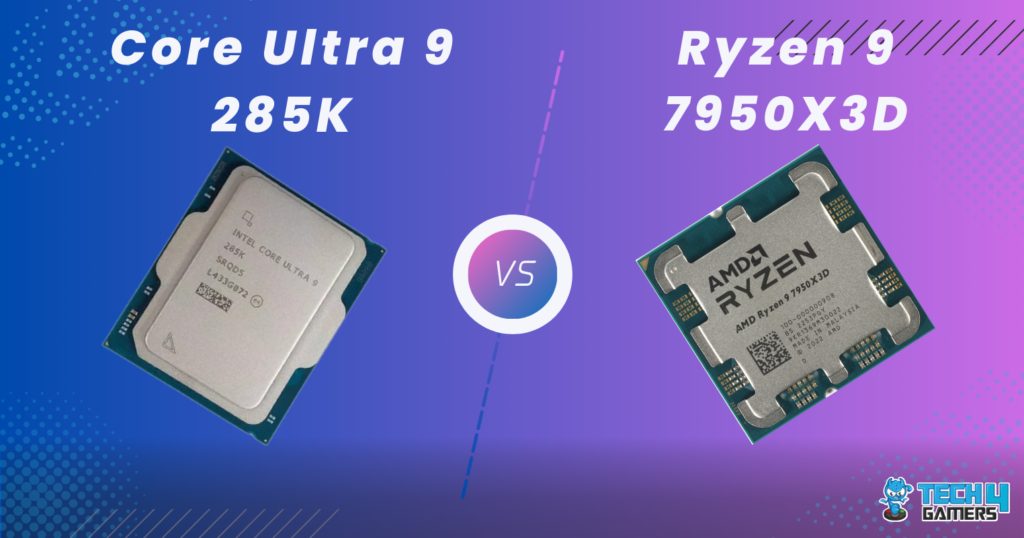
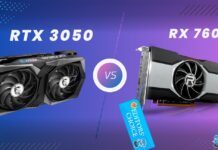
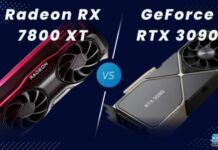
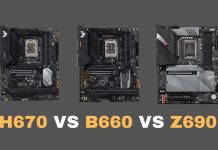
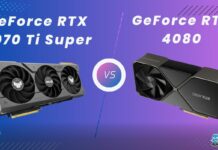
![RX 7700 XT vs RTX 3060 Ti [Gaming Results 2025]](https://tech4gamers.com/wp-content/uploads/2024/01/RX-7700-XT-vs-RTX-3060-Ti-218x150.jpg)